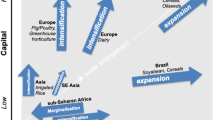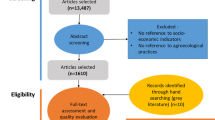Abstract
Since its inception in 1988, the SAREprogram has sponsored hundreds of projects to exploreand apply economically viable, environmentally sound,and socially acceptable farming systems. Recognizingthat researchers often collaborated with producers andthat producer interest in sustainable agriculture wasincreasing, SARE's North-Central Region began directlyfunding farmers and ranchers in 1992 to test their ownideas on sustainable agriculture. The present articleis based on data from the formative evaluation of thefirst five years (1992 to 1996) of the NCR-SAREProducer Grant Program. The evaluation used acombination of mail surveys, non-response telephoneinterviews, and personal interviews.The evaluation revealed that the Program hassucceeded in showing that sustainable agriculturaltechnologies and practices can be viable andprofitable alternatives to conventional ways ofproducing crops and animals while simultaneously beingless environmentally damaging. On the other hand, thecontributions of the Producer Grant Program to thesocial and institutional spheres in which agricultureis embedded are less clear. Changes in these spheresare imperative for the success of sustainableagriculture, and for it to become more mainstream.Such changes cannot occur overnight, but they willremain the main challenge for SARE to tackle in thenear future.
Similar content being viewed by others
References
Allen, J. C. and B. J. Johnson (1996). Quality of Life Effects of Conventional, Transitional and Sustainable Production Systems on Rural Communities and Family Farms in the Western Corn Belt. Final Report to NCR-SARE (LNC94–65).
Allen, P., Debra van Dusen, J. Lundy, and S. Gliessman (1991). “Integrating social, environmental and economic issues in sustainable agriculture.” American Journal of Alternative Agriculture 6(1): 34–39.
Altieri, M. A. (1983). Agroecology. The Scientific Basis of Alternative Agriculture. Berkeley: University of California, Division of Biological Control.
den Biggelaar, C. and M. Suvedi (1998). An Evaluation of the North-Central Region SARE Producer Grant Program. East Lansing, Michigan: AEE Center for Evaluative Studies.
Chu, H. (1999). “Yellow River giving China sorrow.” Los Angeles Times February 18, 1999: A1 and A11.
Cocklin, C. (1995). “Agriculture, society and environment: Discourses on sustainability.” International Journal of Sustainable Development and World Ecology 2(4): 240–256.
Dillman, Don A. (1978). Mail and Telephone Surveys: The Total Design Method. New York: Wiley.
Francis, C. A. and G. Youngberg (1990). “Sustainable agriculture: An overview,” in C. A. Francis, B. Flora, and L. D. King (eds.), Sustainable Agriculture in Temperate Zones(pp. 1–23). New York: Wiley.
Ikerd, J. E. (1996). Evaluating Relative Impacts of Conventional and Sustainable Farming System on Rural Communities. Final Report to NCR-SARE (LNC92–48).
Ikerd, J., G. Devino, and S. Traiyongwanich (1996). “Evaluating the sustainability of alternative farming systems: A case study.” American Journal of Alternative Agriculture 11(1): 25–29.
Ikerd, J. E., D. Osburn, and J. C. Owsley. nd. “Some Missouri farmer's perspectives of sustainable agriculture.” Internet URL: <http://www.ssu.missouri.edu/faculty/jikerd/ papers/tsu-surv.htm>.
MacRae, R. J. (1991). Strategies to Overcome Institutional Barriers to the Transition from Conventional to Sustainable Agriculture in Canada. Ph.D. Thesis, Department of Renewable Resources, MacDonald College of McGill University, Canada.
McKenzie, J. (1998). “Fooling with Mother nature.” ABCWorld News Tonight November 9, 1998.
Northwest Area Foundation (1994). A Better Roe to Hoe. The Economic, Environmental and Social Impact of Sustainable Agriculture. St. Paul, MN: Northwest Area Foundation.
Röling, N. G. and J. Jiggins (1998). “The ecological knowledge system,” in N. G. Röling, and M. A. E Wagemakers (eds.), Facilitating Sustainable Agriculture. Participatory Learning and Adaptive Management in Times of Environmental Uncertainty (pp. 283–311). Cambridge, UK: Cambridge University Press.
Salomon, S., R. L. Farnsworth, D. G. Bullock, and R. Yusuf (1997). “Family Factors Affecting Adoption of Sustainable Farming Systems.” Journal of Soil and Water Conservation 52(4): 265–271.
Smoik, J. D.,T. L. Dobbs, and D. H. Rickerl (1995). “The relative sustainability of alternative, conventional and reduced-till farming systems.” American Journal of Alternative Agriculture 10(1): 25–35.
Smyth, A. J. and J. Dumanski (1995). “A framework for evaluating sustainable land management.” Canadian Journal of Soil Science 75: 401–406.
Sustainable Agriculture Research and Education Program (SARE) (1998). Ten Years of SARE: A Decade of Programs, Partnerships and Progress in Sustainable Agriculture Research and Education. Washington, DC: USDA Cooperative State Research, Extension and Education Service.
Tyrchniewicz, A. and S. Ragone (1997). “Defining sustainability concerns and issues for the North American Great Plains: Challenges and opportunities.” Internet URL: <http://iisd.ca/agri/nebraska/tyrch1.htm>.
Vidal, J. and D. Hencke (1998). “Genetic food facing crisis.” The Guardian (UK) November 18, 1998.
Waltner-Toews, D. (1994). Ecosystem health: “A framework for implementing sustainability in agriculture,” in N. Ole Nielsen (ed.), Agroecosystem Health (pp. 8–23). Guelph, ON: University of Guelph.
Weiss, R. (1999a). “Sowing dependency or uprooting hunger?” Washington Post, February 8, 1999: A9.
Weiss, R. (1999b). “Seeds of discord.” Washington Post February 2, 1999: A1 and A6.
Author information
Authors and Affiliations
Rights and permissions
About this article
Cite this article
Biggelaar, C.d., Suvedi, M. Farmers' definitions, goals, and bottlenecks of sustainable agriculture in the North-Central Region. Agriculture and Human Values 17, 347–358 (2000). https://doi.org/10.1023/A:1026584105482
Issue Date:
DOI: https://doi.org/10.1023/A:1026584105482




